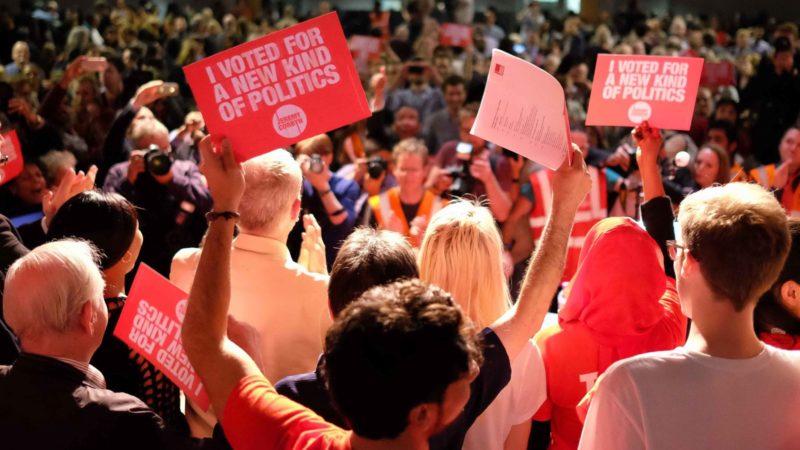
Over the last few years, Momentum has undoubtedly been one of the most influential organisations in the Labour Party. From delivering overwhelming success for their endorsed candidates in internal elections to mobilising thousands of members to campaign for the party, Momentum has shaped our movement significantly. But as Corbynism is coming to an end and a new leader is being elected, what does the future hold for a group seen as Jeremy Corbyn’s ‘praetorian guard’?
Given the context Momentum was founded in – as the movement that sprung out of Corbyn’s 2015 leadership campaign – it is no surprise that loyalty to the Labour leader has been a key feature. The organisation’s members rallied around Corbyn when the parliamentary Labour party launched their ‘coup’ and remained onside even when difficult decisions had to be made – including the divisive question of what Brexit position the party should take.
Momentum’s aim to consolidate Corbyn’s leadership and tighten the grip of the left on the institutions of the party was fairly successful. But on the flip side this meant that the ‘Labour left’ never really defined itself politically. Most of us who have been active in Momentum at some point, either locally or nationally, will be aware that it is a broad church within a broad church.
Membership ranges from revolutionary socialists, Morning Star devotees, middle of the road European-style social democrats, social liberals, old-school trade unionists and ex-anarchists turned radical reformists drawn to a left populist agenda. The one thing that united this coalition was its belief that Corbyn was the best bet to achieve a turn in British politics to put us on the road to socialism and a better world.
Now that Corbyn will be replaced by a new leader, these fractions will emerge more prominently. Although Rebecca Long-Bailey has been touted as the heir apparent by many for some time now, whether a majority of the Corbyn-supporting membership would back her is far from certain. Other candidates could potentially appeal to some demographics of former Corbyn backers or Momentum members – Clive Lewis, for example, has been outspoken on democratising the party.
Not securing mandatory reselection is considered to be one of the biggest failures of the Corbyn project. But even more centre-left candidates like Lisa Nandy or Keir Starmer could appeal to some who identify as the Labour left. Nandy will score points thanks to her focus on winning back working-class towns. Starmer has proven to be popular across the board according to initial YouGov polling. After a defeat as heavy as ours, one should not underestimate the pull of a candidate who’s considered to be electable.
Momentum’s failure to become a social movement, and not just a factional machine, is the reason why the swing of the former Corbyn vote to other candidates is now so unclear. Momentum never became the member-led organisation it promised to be. Internal democracy and opportunities to debate ideas were shut down and replaced with a centralised organisational structure. For example, the national coordinating group (NCG) made decisions on what policies to endorse at last September’s party conference without giving members the opportunity to submit ideas or vote online on priorities.
The promise to hold regular “members’ councils” to facilitate debate never happened. These democratic elements that could have worked out some of the political contradictions among Corbyn’s coalition of supporters were never developed. Instead, we saw a total focus on Labour factional manoeuvring and ‘backing Jeremy’ without much critical engagement with his leadership.
The question for Momentum now is whether it wants to continue as a faction that is associated primarily with a certain individual’s leadership, or whether its role is to develop the Labour left based on ideas and policies. A petition has been circulated demanding that if the group does back a candidate, it only does so on the basis of a ballot of all its members. But some members have expressed their doubts over whether Momentum should endorse a leadership candidate at all.
The potential volatility of the membership could see the a ballot split among candidates resulting in a lukewarm, indecisive endorsement. There are concerns that a heavy split among the memberships would risk the stability of the organisation at a crucial time for its survival.
Others are worried that, by backing an unsuccessful candidate in the race, Momentum would relegate itself to irrelevance within the party. Instead of backing any one candidate, I believe that the organisation should focus on pushing for policy ideas from all leadership contenders and seek to scrutinise their commitment to the radical political agenda. On this basis, Momentum could return to its original promise and focus on building a politicised activist base that keeps the leadership in check.
As the leadership race kicks off in earnest, the NCG is set to meet this weekend to discuss whether an endorsement should take place, and how the membership could potentially be involved in the process of picking the candidate. Whatever the outcome of the discussion, it will have a profound impact on the legacy of the Corbyn project.




More from LabourList
‘Tackling poverty should be the legacy of Keir Starmer’s government’
‘The High Court judgment brings more uncertainty for the trans community’
‘There are good and bad businesses. Labour needs to be able to explain the difference’